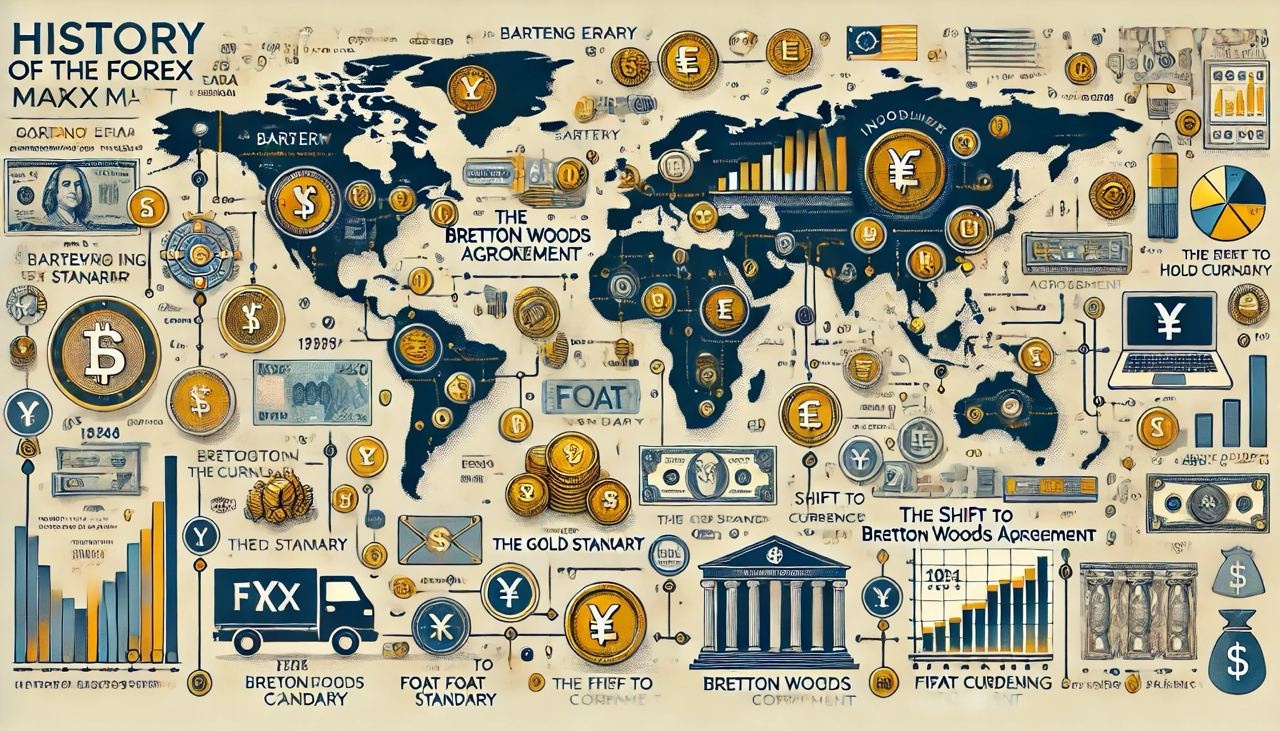Learn Trading for Free and Without Registration
An Online Glossary to Study Trading Independently
The History of Retail Forex Trading
The History of Retail Forex Trading

The History of Retail Forex Trading
When learning about Forex trading, the eagerness to jump into the action is almost overwhelming. However, before taking the first step, you’ll need a real trading account and a reliable broker. To help you make the best choice, we’ve created this guide to assist you in finding the ideal Forex broker.
But first, let’s take a step back and explore how it all began.
The Birth of Retail Forex: From Dream to Reality
The internet has brought countless wonders into our lives: social media, video-sharing platforms, news portals, and educational resources. However, for financial market enthusiasts, one of the greatest innovations has been the advent of retail Forex trading.
Before online Forex brokers, the Forex market was an exclusive playground. Only major banks, institutional investors, and governments had access to currency trading. Even in the 1990s, Forex trading remained out of reach for individual traders due to several barriers:
- High transaction costs. Trading through traditional channels came with substantial fees.
- Regulatory restrictions. Governments tightly controlled currency trading, limiting speculative activity and individual access.
At the time, Forex trading resembled a closed club, where "ordinary people" had little chance of participation.
How It All Changed: A Technological Breakthrough
By the late 1990s, two pivotal developments transformed the Forex market:
- The rise of the internet. The widespread adoption of the internet allowed traders worldwide to access financial markets from virtually anywhere.
- Regulatory changes. The enactment of the Commodity Exchange Act and the Commodity Futures Modernization Act in the U.S. opened the doors for online brokers. These laws simplified access to financial instruments, including currencies, for retail traders.
With the help of emerging technologies, brokers began offering user-friendly online trading platforms, making Forex trading accessible to individual investors. This was a revolutionary moment for the financial world, enabling millions to participate in the global currency market.
The Evolution of Online Trading: From Early Days to Now
In the early 2000s, opening an account with a Forex broker became as easy as setting up an email account. Brokers began offering intuitive platforms, educational resources, and even demo accounts to attract new clients.
Retail Forex trading quickly gained popularity due to several key advantages:
- Low entry barriers. Traders could start with minimal investments.
- Leverage. The introduction of leverage allowed traders to control large positions with relatively small capital.
- Real-time information. Access to live quotes, news, and analytics became standard.
By the 2010s, Forex trading had evolved into a global phenomenon. Hundreds of brokers competed for clients, offering better platforms, tighter spreads, and faster execution.
Modern Times: What Does the Market Offer Today?
Today, retail Forex trading has become an integral part of the financial industry. Modern brokers provide:
- A variety of instruments. In addition to currencies, traders can access CFDs, commodities, stocks, and cryptocurrencies.
- Mobile trading apps. Traders can now execute trades from their smartphones anytime, anywhere.
- Automation. Algorithmic trading and trading bots have gained popularity among traders.
However, with greater accessibility comes increased risk. Some unscrupulous companies use aggressive marketing tactics to mislead inexperienced traders. This makes it crucial to choose licensed brokers to avoid scams.
Conclusion
The history of retail Forex trading demonstrates how technology can transform an entire industry. What was once a closed market accessible only to the largest financial institutions has become a platform open to everyone.
However, success in Forex trading requires more than just access to the market. Knowledge, discipline, and choosing a trustworthy broker are key to navigating this complex yet rewarding field.
Remember, Forex is not just about opportunities—it’s also about responsibility. Make informed decisions, continue learning, and work toward becoming a professional in this exciting world.


